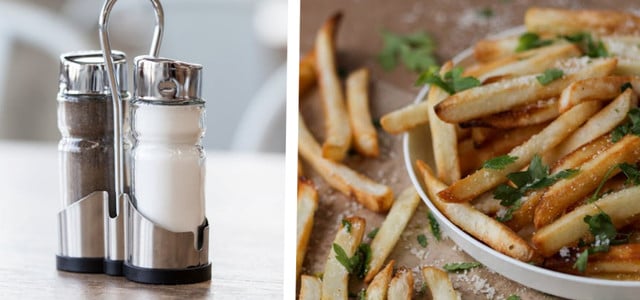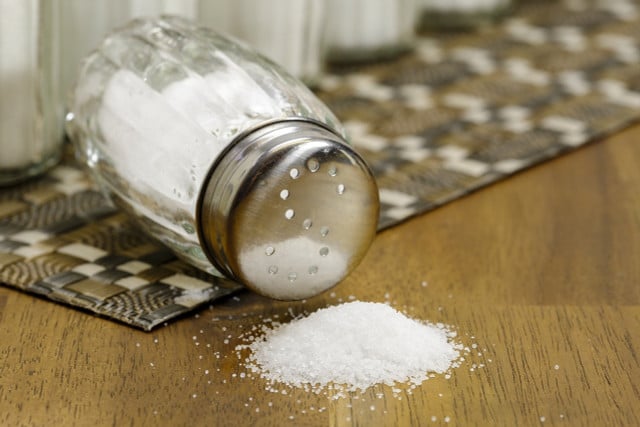
A pinch of salt is a must, even in cakes, for a well-rounded taste. And yet we keep hearing: Don’t eat so much salt! But how much salt is still OK? Why does the body need salt anyway? And what happens if you minimize your salt consumption or even stop eating salt altogether?
Salt belongs in pasta water, in salads and even as a pinch in cakes and desserts. But most people in Germany consume too much salt. In this article, you will find out what health consequences this can have and how you can manage to eat less salt.
This is what the article is about:
-
What exactly is salt?
- Salt: essential for the body
- When is there too much salt?
- Health consequences of excessive salt consumption
- What if you do without it completely?
- How to reduce your salt consumption
Salt: What exactly is it?
On the one hand, we use salt for seasoning, but on the other hand it is very important for preserving food: salt binds water and thus deprives microorganisms of their basis for life. People have been using salt since ancient times to make food last longer.
In everyday language, we speak of salt and mean the table salt used in human nutrition – also known as cooking salt or table salt. Table salt consists mainly of sodium chloride (NaCl) and is the main source of sodium and chloride: we supply the body with around 90 percent of the two electrolytes via table salt.
Not all salt is the same?
There are different types of salt, such as the well-known Himalayan salt. But how different are the different salts and are there really big differences in quality?
In terms of taste, yes: It makes a difference to our taste buds whether we have a fine crumb of salt or a coarse grain of salt on our tongue and how the salt dissolves. In contrast to the size of the salt crystals, the color of the salt does not have a great influence on the taste.
Salt is classified according to the source from which it is extracted:
-
Sea salt is created by the evaporation of sea water
-
Rock salt is mined inside salt mountains
-
Evaporated salt is created by heating salt water extracted from mountains
There are no major differences in the composition of the various types of salt: all salts consist mainly of sodium chloride. The minimal differences are not significant from a nutritional point of view.
In addition to these classic types of salt, there are salts that have a different nutritional value or taste due to additives. These include:
- Iodized salt
- Iodine-fluoride salt
- Spice and herb salts
If you want to know more about the different salts, read the article: Fleur de Sel, sea salt, Himalayan salt, rock salt – is it all just nonsense?
Salt: Essential for the human body
Salt is vital for the human body, as it cannot produce sodium or chloride itself and is therefore dependent on the supply of these two electrolytes through salt. Both electrolytes are essential for bodily functions such as maintaining fluid balance and regulating blood pressure.
Without sodium and chloride, the body cannot absorb water into the cells. This is why, for example, in endurance sports, the intake of salt is very important in addition to the intake of fluids. The body also needs sodium to transmit stimuli in nerve fibers and thus for the function of the muscles. Chloride is a component of stomach acid.

Salt: How much is too much?
The World Health Organization (WHO) recommends an intake of five grams of salt per day. The German Nutrition Society (DGE) gives a guideline value of up to six grams of table salt per day – that’s about a teaspoon of salt. For vital body functions, 3.8 g of salt would probably be enough.
However, studies show that most people in Germany consume significantly more salt per day. Women aged 18 to 79 consume an average of 8.4 grams of salt per day. For men, the figure is around 10.0 grams per day. Many people consume even larger amounts:
- 39 percent of women and 50 percent of men consume more than ten grams of salt per day.
- For 15 percent of women and 23 percent of men, the amount is even more than 15 grams of salt per day.
These figures show that the majority of the population consumes far too much salt, which has negative health consequences.
Salt: What happens when you eat too much
If you are one of those people who eat too much salt, you are probably at an increased risk of developing high blood pressure. This is because the body binds excess salt to water in order to keep the sodium concentration constant. This makes you thirsty because the need for fluids increases. The result: the blood volume increases and the increased pressure in the vessels puts a strain on the heart, kidneys and brain.
Long-term high salt consumption increases the risk of developing high blood pressure (hypertension) in many people. Hypertension, in turn, is one of the most important risk factors for cardiovascular disease and stroke.
However, there are differences in how strongly people’s blood pressure reacts to salt. A distinction is made between “salt-sensitive” and “non-salt-sensitive” people: In salt-sensitive people, blood pressure changes due to a change in salt intake. In non-salt-sensitive people, the change in intake has little or no effect on blood pressure. Only a medical examination can determine which salt type you belong to.
In the worst case, too much salt can even be fatal: an intake of one to two grams of salt per kilogram of body weight leads to death. However, it is very unlikely that these amounts of salt can be consumed through food.
What happens when you stop eating salt?
Our body needs salt – so avoiding salt completely is not advisable. As self-experiments show, just a few days without salt are enough to notice this: If you consume too little salt – i.e. electrolytes – and at the same time perhaps exercise, sweat and drink a lot of water, you will experience circulatory problems.
This can also happen to athletes who drink too much water without salt (electrolytes). Hyponatremia describes the low sodium concentration in the blood, which can sometimes even lead to death.
However, reducing salt consumption is recommended for most people. If you reduce your salt consumption, it will have a positive effect on your health: after just a few weeks, your blood pressure will drop. Other effects on your health can be:
- The risk of cardiovascular disease and stroke is reduced.
- A low-salt diet will mean you eat fewer highly processed foods, which can also have a positive effect on your health.
- Reducing your salt consumption will have an overall positive effect on your life expectancy.
How to reduce your salt consumption
A maximum of one teaspoon of salt per day is the best amount you should consume: That’s a lot, you might think. But the six grams per day doesn’t just mean the amount of salt you use for adding salt or cooking. It also includes the salt we consume through processed foods – and that makes up by far the largest proportion.
In fact, we absorb most of our salt through eating foods such as bread and rolls, meat, sausage and cheese. For example, a pretzel roll contains one gram of salt and a slice of Gouda cheese contains 0.6 grams of salt.
To reduce salt consumption, the following helps:
- Take it slowly: get used to less salt step by step. That will be easier.
- Choose unprocessed products such as vegetables and fruit instead of processed foods.
-
Cook and bake yourself: This way you can determine how much salt you use.
- Seasoning with spices and herbs: They cannot replace salt, but they complement it very well. Read also: Salt substitute: These alternatives season your food without salt
- If you eat processed foods, it is worth looking at the nutritional table and choosing the lower-salt option.
Read more on Techzle\.com:
- This is what happens in the body when we stop eating sugar
- Planetary Health Diet: This is what the perfect diet plan looks like
- 10 foods that are not as healthy as you think
** marked with ** or orange underlined Links to sources are partly affiliate links: If you buy here, you are actively supporting Techzle\.com, because we then receive a small part of the sales proceeds. .